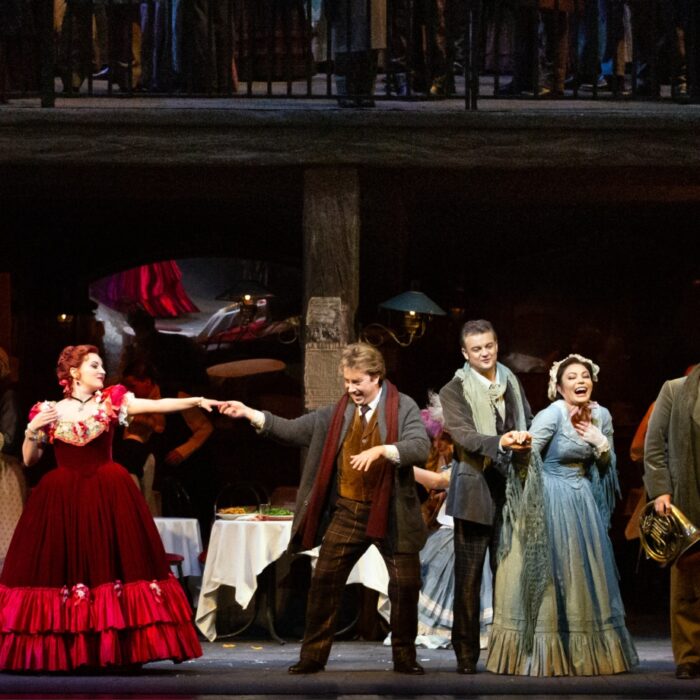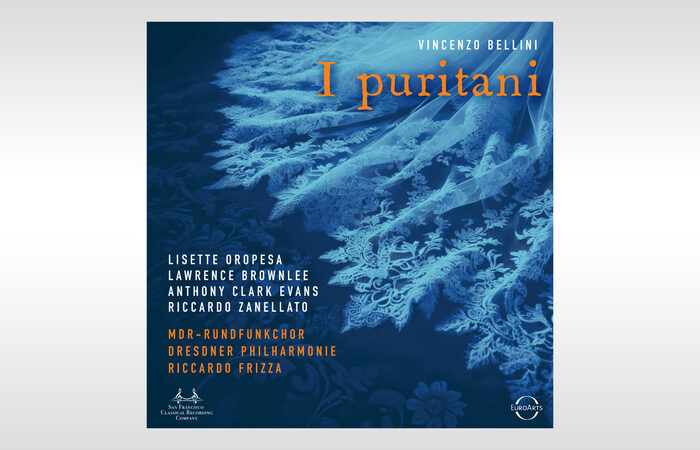
Northern Ireland Opera 2023-24 Review: Sea Wrack
Menzies Innovative Programing Brings Irish Art Songs To The Stage
By Alan Neilson(Photo: Neil Harrison Photography)
Northern Ireland Opera is not flush with money. Fortunately, however, it has an imaginative artistic director in Cameron Menzies, whose innovative approach ensures that the company is able to provide a wide range of productions over the season, which it tours to locations across the province.
Unable to afford more than a single fully staged opera production a year, Menzies searches out alternative ways of bringing the art form to its audience. One of his ideas was the introduction of the “Salon Series,” six one-act staged works for voice and piano. The series includes presentations from a variety of genres, such as Poulenc’s “La Voix Humaine” and “Bewitched, Bothered and Bewildered,” a selection of songs from the golden age of American musical theatre with works by Gershwin, Sondheim and others.
A Clearly Visualized Staging & A Fascinating Program
In early November, Belfast’s Metropolitan Arts Centre (the MAC) hosted a presentation of the company’s “Sea Wrack,” a song cycle of traditional Irish ballads rearranged as art songs by a diverse range of composers, stretching from the 19th century to the present day, on the theme of the passing of time, of memories conjuring up feelings of absence, death, lost love and homesickness.
The audience was met by a colorful, aesthetically pleasing stage set, designed by Menzies, cluttered with 19th century lamps and paraphernalia, including plenty of suitcases with a grand piano situated centrally, hinting simultaneously at the idea of the salon and travel. It functioned perfectly as a backdrop for the singers and the sentiments they were expressing, as well as an area that allowed them to take a seat amongst the onstage clutter, from which they reemerged as needed, and successfully distanced it from the impression of a concert performance. Costumes were similarly designed to create an impression of the salon.
The program had a pleasing balance, moving between songs for solo voice and duets, employing a soprano, a mezzo, a tenor and a baritone in various combinations.
However, the performance began with “Sea Wrack,” an ensemble piece using all four voices, taken from Agnes Shakespeare Higginson’s “Songs of Antrim” and set to music by Hamilton Harty in the early 1900s, in a new arrangement by Bryan Evans. It is an attractive song with a poignant melody that tells of two men collecting the wrack, a pungent seaweed found on the beaches and seas around Ireland, to turn into kelp. The death of wrack is intimately bound to the fate of the two men, one of whom appears to drown while the other is abandoned on the rocks.
It is a fascinating song in which you can feel the waves of the sea and sense an eerie, even sinister, atmosphere in the music. Evans’ arrangement made excellent use of the four individual voices and as a chorus, whose intonation sounded like a presence, ominously hinting at the fate that befell the men.
Four Fine Soloists
Soprano Susie Gibbons took full advantage of the opportunity to show off her interpretative skills with a fine reading of “A Young Maid Stood in Her Father’s Garden,” a traditional ballad that relates a love story, arranged by Herbert Hughes. She provided a sensitive rendition without descending into emotional excess, in which her attention to phrasing and articulation impressed.
Her singing of “To the Gods of the Harbour and Heartland” by Hamilton Harty was a little less successful. Although she produced an expressively strong and resonantly powerful rendition, she gave the impression of making too much effort, which compromised the clarity of her diction.
The most well-known of the songs was “Carrickfergus,” which was performed in an arrangement by Matthew Owens for mezzo-soprano. It was given a warm and heartfelt reading by Jenny Bourke, who brilliantly captured the feeling of homesickness, in which her voice sensitively caressed the line, imbuing it with a sentimental longing that showed off her wonderful alluring, middle register to good effect.
She also gave a moving rendition of Hamilton Harty’s “Lovely Jimmie,” in which she engaged thoughtfully with the text, although it was noticeable that her voice became a little harsh as she pushed forcefully into the upper register.
Baritone Seamus Brady possesses a truly beautiful voice with a burnished timbre that retains its sheen as he moves across the range. His essaying of “She is Far from the Land,” with a text by the famous Irish poet Thomas Moore on lost love, allowed him to show off the wonderful qualities of his voice along with his sensitivity in bringing out the meaning of the text. Unfortunately, he has a tendency to swallow his words and, on occasions, let words trickle off the tongue without sufficient emphasis. Taking into account that he is only 21 years of age and still studying, it was an impressive performance and suggests he has a bright future ahead of him.
In 1789, the Irish rebel Robert Emmet stood on the gallows and made a speech that was to echo down the years. Hector Berlioz moved by the words set Thomas Moore’s account of the incident to music in his song “Elergie.” Tenor Michael Bell, producing a standout performance, managed to bring out the full impact of the text with a detailed, thoughtful and expressively strong rendition, which displayed his vocal versatility and seamless passaggio to good effect.
He also sang “At the Mid-Hour of Night” by Charles Wood, to which he once again brought expressive strength, versatility and vocal beauty.
The songs for solo voice were interspersed with three duets.
Neil Martin made a quite beautiful and sensitive arrangement of the traditional air “Méilte Cheann Dubhrann” for mezzo and baritone. The air, written in Gaelic, relates a man’s sad reflections on leaving his homeland, to which he never expects to return. While Brady’s warm-toned baritone brought out the depth of his love for the land, Bourke’s steely-toned upper register was able to capture the pain of his thoughts of separation from the land of his birth. The two voices combined wonderfully to create a full picture of the man’s heartfelt feelings about having to emigrate.
The other two duets, “A River Runs Beneath Us” by Peter Wilson in an arrangement by Matthew Reeve and “Sainted Mother, Guide His Footsteps” by William Vincent Wallace, were both written for soprano and mezzo. Gibbons and Bourke’s contrasting voices combined nicely to give both pieces a pleasing tonal texture, which added to their appeal. “A River Runs Beneath Us” also showed off Gibbons’ naturally attractive upper register.
The program was brought to a pleasing conclusion with Neil Hannon’s “Sunrise” in an arrangement by Paul Campbell for the full ensemble, in which Bell’s wonderful singing once again caught the attention. He is a talent to watch!
The pianist Frasier Hickland provided splendid accompaniment with a dramatically sensitive, clear performance that successfully caught the melody of each piece. He also had a close connection with the singers, ensuring a pleasing balance existed throughout the evening.
Lasting only about an hour in length, “Sea Wrack” proved to be an absorbing and imaginative production that revealed the beauty of traditional Irish songs when refashioned as art songs. It captured the sentimentality and nostalgia that lie at the heart of Irish traditional music and successfully presented it through the refined lens of the salon. It worked splendidly, and the audience brought the cast back for an encore of the opening piece, “Sea Wrack.” One can only hope that there is an innovative company out there willing to make a commercial recording.



